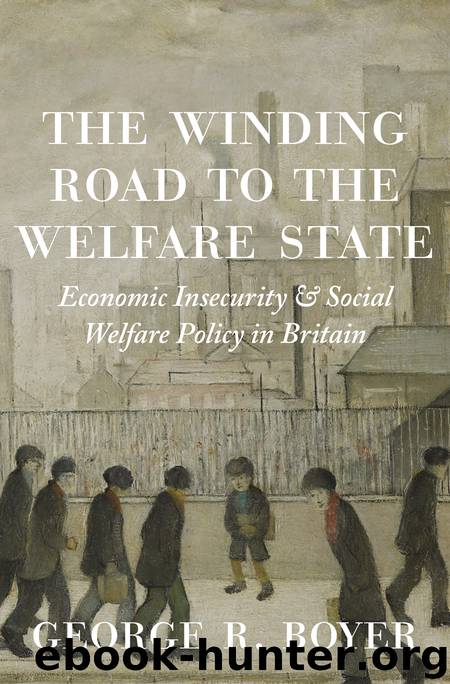The Winding Road to the Welfare State by Boyer George R

Author:Boyer, George R.
Language: eng
Format: epub
ISBN: 9780691183992
Publisher: Princeton University Press
THE ROYAL COMMISSION ON THE POOR LAWS
AND THE DEBATE OVER UNEMPLOYMENT RELIEF
The downturn of 1904–5 led Balfour’s Conservative government to address the problem of unemployment and examine the state of social welfare policy. In August 1905 Parliament adopted the Unemployed Workmen Act, and four months later, just before leaving office, the Balfour government appointed the Royal Commission on the Poor Laws and Relief of Distress. The commission was charged with inquiring into the workings of the Poor Law and also “into the various means which have been adopted outside of the Poor Laws for meeting distress arising from want of employment, particularly during periods of severe industrial depression; and to consider and report whether any . . . modification of the Poor Laws or changes in their administration or fresh legislation for dealing with distress are advisable.”45
The commission was chaired by Lord George Hamilton, and its membership included, among others, C. S. Loch, Helen Bosanquet, and Octavia Hill from the COS, the Fabian socialist Beatrice Webb, five Guardians of the Poor, including the socialist George Lansbury, the permanent heads of the Local Government Boards of England, Scotland, and Ireland, three representatives of the Church of England and one of the Roman Catholic Church, two political economists, and Charles Booth, who resigned in 1908 due to ill health. Webb wrote that “the Commission was, in fact, predominantly a body of experts, either in poor law administration or social investigation.”46 Its inquiries lasted for three years, and resulted in two large reports published in February 1909: a Majority Report signed by the chairman and 14 others, and a Minority Report—written by the Webbs—signed by Beatrice Webb and three others.
As per its charge, the commission examined not only the Poor Law but also other methods of dealing with distress, and in particular policies devoted to relieving the unemployed. Several prominent individuals testified before the commission on the topic of unemployment, including Sidney Webb, William Beveridge, at the time a member of London’s Central Unemployed Body, Wilson Fox of the Board of Trade, and professors Bowley and Chapman. Their testimony and the background material they supplied to the commission contain a wealth of information on nineteenth-century unemployment relief, and demonstrate clearly the extent to which the proposals put forward in the Majority and Minority Reports grew out of lessons learned from the successes and failures of previous policies to relieve the unemployed.
Those who testified before the Royal Commission almost universally condemned the use of relief works for assisting the temporarily unemployed, as did Jackson and Pringle, authors of a report for the commission about the effects of unemployment relief since 1886. In a passage quoted approvingly by both the Majority and Minority Reports, Jackson and Pringle concluded that “the Municipal Relief Works, encouraged by Mr. Chamberlain’s circular in 1886, have been in operation for twenty years, and must, we think, be pronounced a complete failure—a failure accentuated by the attempt to organise them by the Unemployed Workmen’s Act of 1905.”47 The major problem with
Download
This site does not store any files on its server. We only index and link to content provided by other sites. Please contact the content providers to delete copyright contents if any and email us, we'll remove relevant links or contents immediately.
International Integration of the Brazilian Economy by Elias C. Grivoyannis(57323)
The Radium Girls by Kate Moore(10907)
Turbulence by E. J. Noyes(7039)
Nudge - Improving Decisions about Health, Wealth, and Happiness by Thaler Sunstein(6633)
The Black Swan by Nassim Nicholas Taleb(6190)
Pioneering Portfolio Management by David F. Swensen(5606)
Rich Dad Poor Dad by Robert T. Kiyosaki(5149)
Zero to One by Peter Thiel(4824)
Man-made Catastrophes and Risk Information Concealment by Dmitry Chernov & Didier Sornette(4736)
Secrecy World by Jake Bernstein(3782)
Millionaire: The Philanderer, Gambler, and Duelist Who Invented Modern Finance by Janet Gleeson(3569)
Skin in the Game by Nassim Nicholas Taleb(3460)
The Age of Surveillance Capitalism by Shoshana Zuboff(3422)
The Money Culture by Michael Lewis(3284)
Skin in the Game: Hidden Asymmetries in Daily Life by Nassim Nicholas Taleb(3264)
Bullshit Jobs by David Graeber(3179)
The Dhandho Investor by Mohnish Pabrai(3168)
The Wisdom of Finance by Mihir Desai(3078)
Blockchain Basics by Daniel Drescher(2890)
